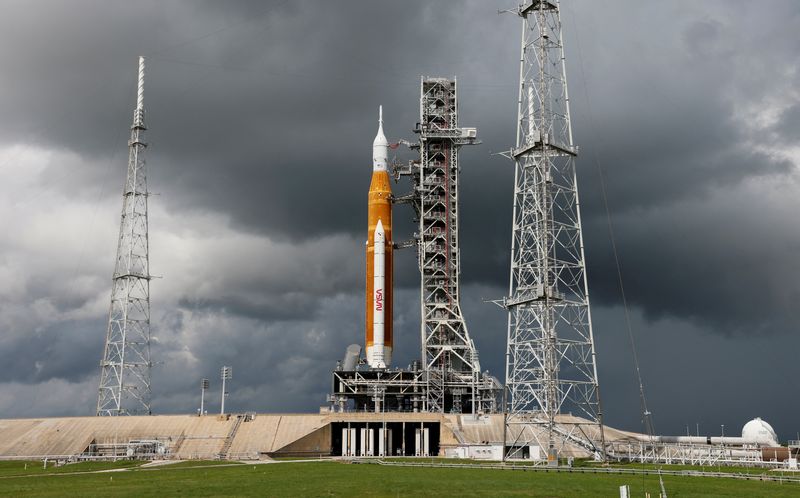By Joey Roulette and Steve Gorman
CAPE CANAVERAL, Fla. (Reuters) -For the second time in a week, NASA on Saturday aborted an attempt to launch its giant, next-generation rocketship, citing a stubborn fuel leak that the space agency said could delay the debut mission of its moon-to-Mars Artemis program by at least several weeks.
Preflight operations were called off for the day about three hours before the 2:17 p.m. EDT (1817 GMT) liftoff time targeted for the 32-story-tall Space Launch System (SLS) rocket and its Orion capsule from Cape Canaveral, Florida.
The uncrewed test flight, aimed at launching the capsule out to the moon and back, was to have marked the inaugural voyage of both the SLS and Orion a half century after the last lunar mission of Apollo, forerunner of the Artemis program.
The countdown was scrubbed after Kennedy Space Center technicians made three failed attempts to fix a "large" leak of supercooled liquid hydrogen propellant being pumped into the rocket's core-stage fuel tanks, agency officials said.
The initial launch try on Monday was likewise foiled by technical problems, including a different leaky fuel line, a faulty temperature sensor and cracks found in insulation foam.
Mission managers proceeded with a second launch attempt on Saturday once the earlier issues had been resolved to their satisfaction. And NASA had reserved another backup launch time, for either Monday or Tuesday, in case a third try was needed.
But after a review of data from the latest difficulties, NASA concluded the new hydrogen leak was too tricky and time-consuming to finish troubleshooting and fix on the launch pad before the current launch period allotted to the mission expires on Tuesday.
The delay means the earliest opportunity to try again would come during the next launch period that runs Sept. 19-30, or during a subsequent October window, an associate NASA administrator, Jim Free, told reporters at a late-afternoon briefing.
He said the postponement also would involve rolling the spacecraft back into its assembly building, under Cape Canaveral "range" rules limiting how long a rocket may remain at its launch tower before undergoing a new round of safety checks indoors.
Mike Sarafin, NASA's Artemis mission manager, said efforts to resolve the latest technical snag would entail "several weeks of work."
NASA chief Bill Nelson said earlier in the day that a rollback would postpone the next launch attempt at least until mid-October, in part to avoid a scheduling conflict with the next International Space Station crew due for launch early that month.
Launch-day delays and malfunctions are not uncommon in the space business, especially for new rockets such as NASA's Space Launch System, a complex vehicle with a set of pre-liftoff procedures that have yet to be fully tested and rehearsed by engineers without a hitch.
On average, the odds of scrubbing a launch on any given day for any reason, including foul weather, are about one-in-three.
"We're not going to launch until it's right, and that is standard operating procedure, and will continue to be," Nelson said at the briefing.
The last-minute setbacks on the launchpad came at the tail end of a development program more than a decade in the making, with years of delays and billions of dollars in cost overruns under NASA's respective SLS and Orion contracts with Boeing (NYSE:BA) Co and Lockheed Martin Corp (NYSE:LMT).
MOON TO MARS
Apart from its technical challenges, Artemis I signals a major turning point for NASA's post-Apollo human spaceflight program, after decades focused on low-Earth orbit with space shuttles and the International Space Station.
Named for the goddess who was Apollo's twin sister in ancient Greek mythology, Artemis aims to return astronauts to the moon's surface as early as 2025, though many experts believe that time frame will likely slip.
Twelve astronauts walked on the moon during six Apollo missions from 1969 to 1972, the only spaceflights yet to place humans on the lunar surface. But Apollo, born of the U.S.-Soviet space race during the Cold War, was less science-driven than Artemis.
The new moon program has enlisted commercial partners such as SpaceX and the space agencies of Europe, Canada and Japan to eventually establish a long-term lunar base of operations as a stepping stone to even more ambitious human voyages to Mars.
Getting the SLS-Orion spacecraft launched is a key first step. Its first voyage is intended to put the 5.75-million-pound vehicle through its paces in a rigorous test flight pushing its design limits and aiming to prove the spacecraft suitable to fly astronauts.
If the mission succeeds, a crewed Artemis II flight around the moon and back could come as early as 2024, to be followed within a few more years with the program's first lunar landing of astronauts, one of them a woman, with Artemis III.
Billed as the most powerful, complex rocket in the world, the SLS represents the biggest new vertical launch system NASA has built since the Saturn V of the Apollo era.
Although no humans will be aboard, Orion will carry a simulated crew of three - one male and two female mannequins - fitted with sensors to measure radiation levels and other stresses that real-life astronauts would experience.
